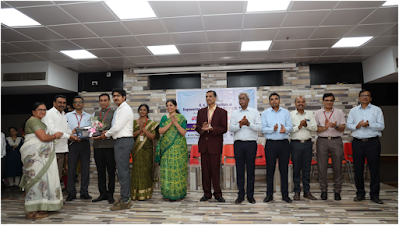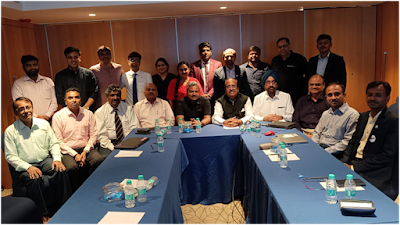Department Events
Celebrating IEEE Power Electronics Day on 20/06/2024
On June 20th, 2024, the Department of Electrical
Engineering of K.K.Wagh Institute of Engineering Education & Research marked a significant
milestone by hosting the IEEE Power Electronics Day Celebration. Our talented
students showcased their innovative projects in Power Electronics,
demonstrating their ingenuity and technical prowess.
The event was graced by esteemed industry experts
who evaluated the projects and provided invaluable feedback. This interaction
was a golden opportunity for our students, bridging the gap between academic
knowledge and industry practice.
Admission Awareness seminar on 27/06/2024
The First
Year Engineering Admission Awareness seminar was conducted on 27th June 2024 at
Buldhana. Dr. Ravindra
Munje provided
the complete overview of the institute and various courses run by the institute
and Dr Vilas Patil provided
information on FY Admissions and addressed all the queries of parents and
aspiring students.
Student Corner
Student Placement
The following
students are placed in various multinational companies. Congratulations to all
the students!
Placed
Students Details (June - 2024)
|
Sr. No. |
Name of the Student |
Package |
Placement Date |
1. |
Tejas Kautik Wagh |
3 |
13/06/2024 |
2. |
Gawande Uday |
4.2 |
17/06/2024 |
|
3. |
Krutika Salve |
4.2 |
17/06/2024 |
|
4. |
Mayuresh Kulkarni |
4.2 |
17/06/2024 |
|
5. |
Sonawane Mangesh
Kishor |
4.2 |
17/06/2024 |
|
6. |
Mehul Ravindra
chaudhari |
4.2 |
17/06/2024 |
|
7. |
Siddhesh Dilip
Suryavanshi |
4.2 |
17/06/2024 |
|
8. |
Yash Pundlik cheke |
4.2 |
17/06/2024 |
|
9. |
Aniket Sanjay Gulve |
4.2 |
17/06/2024 |
|
10. |
Apurva Anil Kothawade |
4.2 |
17/06/2024 |
|
11. |
Katkade Pratik Sanjay |
4.2 |
17/06/2024 |
|
12. |
Shaikh Shahrukh
Khayyum |
4.2 |
17/06/2024 |
We are thrilled to announce the felicitation ceremony honoring the proud
parents of Kalpesh Patil, Adinath Lahane,Priyanka Gosavi, and Sakshi Ohol. Rajashree
Kushare, Sarthak Jadhav, Om Paner, Prasad Mandlik. Rahul Avhad, Ashish Khatalon May 27th, 2024, at the
prestigious Aurangabadkar Hall, Nashik. Students have achieved a remarkable
milestone by securing a coveted position in a multinational company, and we
couldn't be prouder.
The ceremony was graced by esteemed personalities Dr. Keshav Nandurkar and Dr. Sunil Kute, Dr. Preeti Bhamre Dr. Ravindra
Munje Dr. Pramod Shahabadkar Dr. Vandana Bagal, Dr. P. D. Dhake, Dr. Suyog
Jain, Dr. Padmakar Pawar, Dr. Sanjay D. Barahate, Dr. Saroj Dhake whose
presence added immense value to the event.
This achievement underscores the student's dedication, hard work, and
determination. We extend our heartfelt congratulations to his family on this
significant accomplishment. Here's to many more successes on her journey ahead!
Faculty Corner
Congratulations Prof. Nayana N Jangle
Congratulations Prof. Ganesh Jadhav
IET CCSA Meeting on 15th June 2024
Dr. Ravindra Munje attended the IET CCSA Meeting on
15th June 2024 at Courtyard by Marriott as a CCSA Member of the IET Nashik
Local Network. CCSA stands for Communities Commitee South Asia. The objectives
of CCSA are to support regional activities, drive communication between
communities and share best practice methods among the IET Local Networks.
Felicitation for IET Members
Dr. Keshav Nandurkar, Dr. Ravindra Munje, Prof. S. K.
Shinde, Dr. Prashant Kushare, Prof. Nayana Jangle and other members from K.K.Wagh Institute of
Engineering Education & Research attended the Networking Dinner organized
by the IET CCSA Meeting on 14th June
2024 at Courtyard by Marriott. It was a great opportunity to interact with the
IET Volunteers from other Local Networks. During this interaction, Dr. Keshav Nandurkar felicitated Mr. Shekar Sanyal, Head of IET India, Dr. Ravindra Munje felicitated Mr. R. N. Rajpoot, Past Chairman of IET
CCSA and Dr Prashant Kushare
felicitated Mr. Ajay Kulshreshta,
Chairman of IET CCSA and Prof. Nayana
Jangle felicitated Ms. Varsha
Kothari, IET Bangalore office staff.
Student Articles
AkshayNarayanKakade,BEDiv-B(Electrical) akshaykakade1213@gmail.com
Introduction
Photovoltaic(PV) systems are widely utilized for harnessing solar energy, and maximizing their efficiency is crucial for sustainable energy production. One of the key challenges in PV systems is tracking the Maximum Power Point (MPP) to ensure optimal energy conversion. In recent years, advanced control techniques have gained attention, and the Adaptive Neuro Backstepping Controller (ANBC) has emerged as a promising solution for MPP tracking.
1. Understanding Adaptive Neuro Backstepping Control
The Adaptive Neuro Backstepping Controller combines adaptive control strategies with neural networks to enhance the tracking performance of nonlinear systems. This controller is particularly well-suited for PV systems, which exhibit complex and time-varying characteristics. The backstepping approach allows the controller to handle uncertainties in the system dynamics, while the adaptive component ensures continuous adjustment to changing conditions.
2. Real-Time Implementation Challenges
Implementing ANBC in real-time for MPP tracking involves addressing various challenges. One key aspect is the integration of neural networks to approximate the nonlinearities of the PV system. Training the neural network in real time and ensuring its accuracy under different operating conditions is crucial for the success of the controller. Additionally, the adaptive nature of the controller requires continuous parameter updates to adapt to variations in the PV array.
3. Benefits of ANBC for MPP Tracking
(i) Improved Tracking Accuracy: NBC excels in providing accurate MPP tracking, even in the presence
of system uncertainties and variations.
(ii) Robustness: The adaptive nature of the controller enhances robustness, making it well-suited
for real-world PV systems with dynamic operating conditions.
(iii) Reduced
Oscillations: Backstepping control minimizes oscillations, leading to smoother
operation and increased energy harvesting efficiency.
(iv) Adaptability: The controller can adapt to changes in environmental conditions, such as variations
in solar radiation and temperature, ensuring optimal performance.
4. Experimental Validation
Extensive experimental testing is essential to validate the real-time implementation of the ANBC for MPP tracking. Utilizing a hardware-in-the-loop (HIL) setup with a
realistic PV emulator, researchers can simulate various operating scenarios and
assess the controller’s performance under dynamic conditions. These experiments
provide valuable insights into the controller’s adaptability and robustness in
a controlled environment before deployment in actual PV systems.
5. Future Scope
The future scope of
real-time implementation of the Adaptive Neuro Backstepping Controller (ANBC)
for Maximum Power Point Tracking (MPPT) in Photovoltaic (PV) systems holds
significant promise, with potential advancements in several key areas.
(i) Integration of Machine Learning Techniques
Future developments
may involve further integration of machine learning techniques toenhance the
adaptive capabilities of the ANBC. Deep learning approaches, such as deep
neural networks or reinforcement learning, could be explored to improve the
controller’s ability to adapt to complex and dynamic operating conditions.
(ii) Enhanced Neural Network Architectures
Research can focus on
developing more sophisticated neural network architectures to better model the
nonlinearities inherent in PV systems. This could include the exploration of
recurrent neural networks or attention mechanisms to capture temporal
dependencies and improve the accuracy of the neural network component.
(iii) Hybrid Control Strategies
Investigating hybrid control strategies that combine the strengths of ANBC with other control methodologies could be an exciting avenue. This might involve integrating predictive control methods or combining ANBC with traditional proportional-integral-derivative (PID) controllers to achieve a synergistic effect, optimizing stability and adaptability.
(iv) Real-Time Parameter Estimation Techniques
Continuous
improvement in real-time parameter estimation techniques is essential for the
success of adaptive controllers. Future research might focus on developing more
robust and computationally efficient methods for estimating and updating the
parameters of the ANBC in real time, ensuring accurate adaptation to changing
environmental conditions.
(v) Cyber-Physical Systems and Internet of Things (IoT) Integration
Integrating
ANBC with Cyber-Physical Systems (CPS) and IoT technologies could open new
possibilities. This includes the use of sensor data from the PV system, weather
predictions, and other relevant parameters to enhance the controller’s
decision-making process and improve overall system efficiency.
(vi) Experimental Validation in Real-World Settings
As the technology
matures, there will be a growing need for extensive experimental validation in
real-world PV installations. Field trials and long-term studies can provide
valuable insights into the controller’s performance under diverse climatic
conditions and varying system configurations.
(vii) Implementation in Microgrid and Smart Grid Systems
Extending the
application of ANBC beyond standalone PV systems to microgrid and smart grid
environments is a logical progression. The controller’s adaptability and
robustness make it potentials candidate for managing distributed energy
resources in complex grid structures.
(viii) Standardization and Commercialization
Standardizing the
implementation of ANBC for MPPT in PV systems will be crucial for widespread
adoption. As the technology matures, efforts to establish industry standards
and protocols can accelerate its integration into commercial photovoltaic
solutions.
6. Conclusion
The real-time implementation of the Adaptive Neuro Backstepping Controller presents a promising approach for enhancing MPP tracking in Photovoltaic Systems. Its ability to handle nonlinearities, adapt to changing conditions, and reduce oscillations makes it a robust solution for improving the efficiency and reliability of solar energy harvesting. Further research and practical implementation will contribute to the advancement of adaptive control strategies in renewable energy systems.






























No comments:
Post a Comment